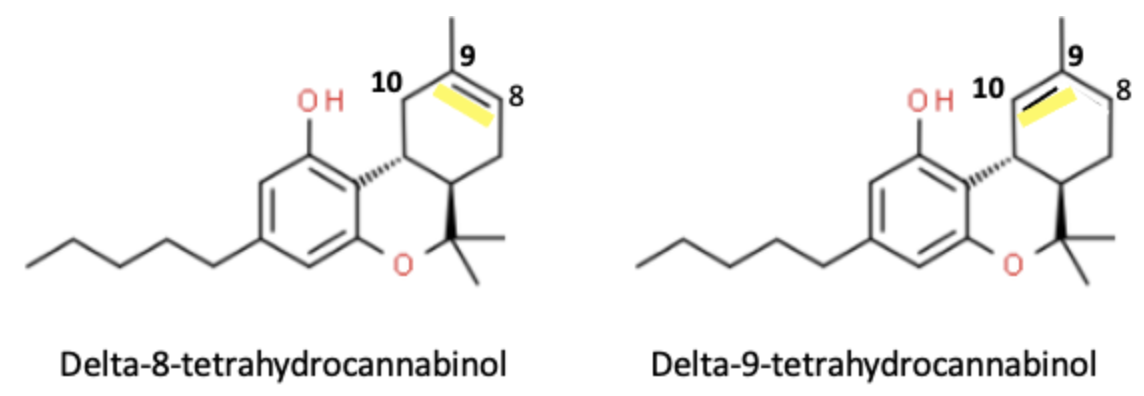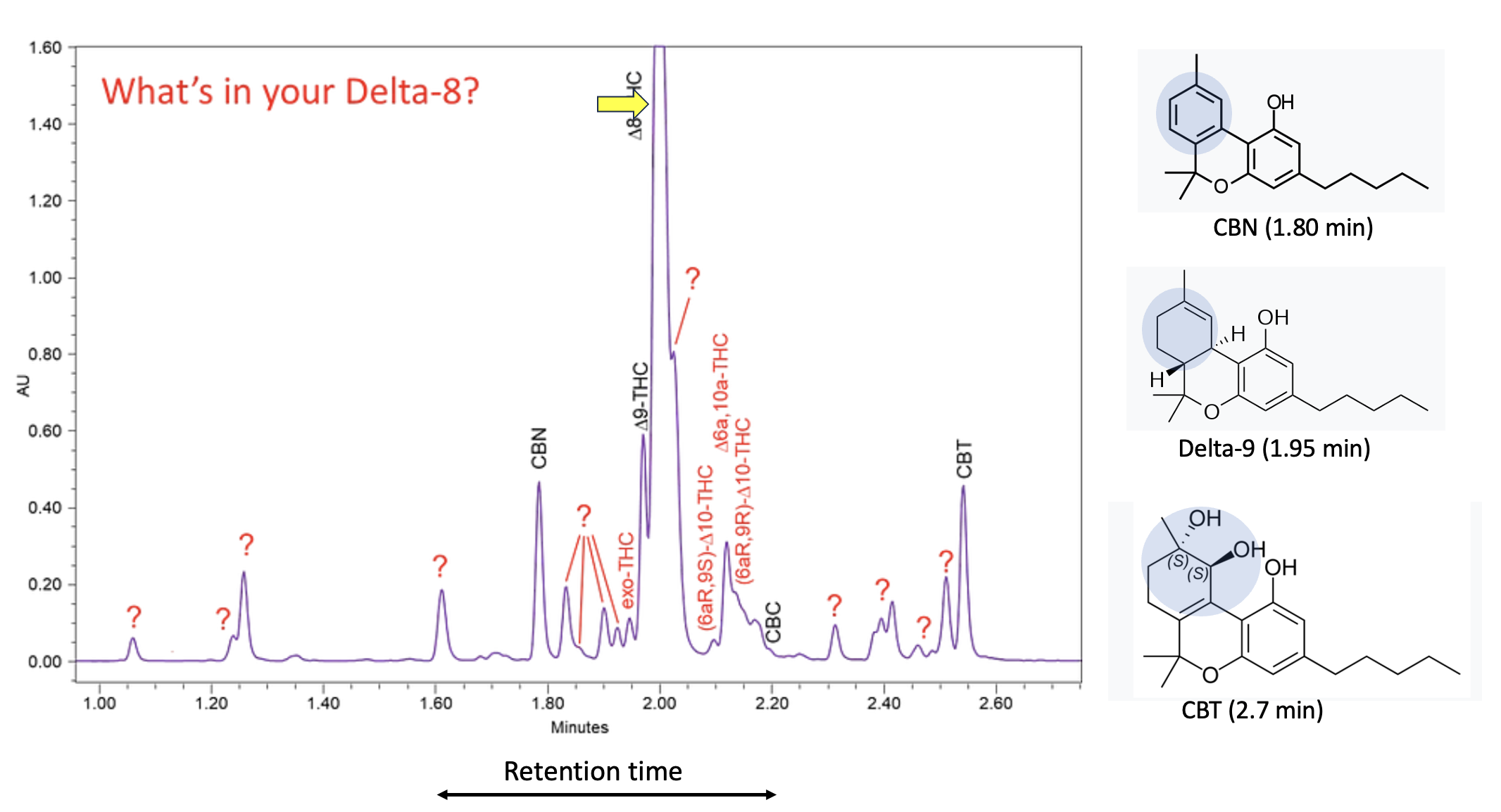Even though the following paragraph doesn't appear to have much to do with delta-8 THC, an isomer of delta THC, the primary intoxicant of marijuana, keep reading; it will.
The Wild West of Dietary Supplements
I've written numerous times about the deficiencies (and this is putting it mildly) in the dietary supplement industry. Specifically:
- Sometimes supplements don't contain any of whatever is claimed to be in the bottle (1)
- When they do, the actual amount in the bottle can range from very little to too much.
- The purity of what's in the bottle can range from ghastly to good.
- You'll never know which
- Many supplements, especially those for erectile dysfunction, contain a prescription drug, which is why the product works at all.
- The FDA has no say in the product's approval; it can only act once a problem is reported.
- Problems are reported. More often than you'd think.
- Bottom line: You never really know what you're taking
Why Delta-8?
It's no secret that our drug laws are moronic, and delta-8 provides as good an example of this as any. This can hardly be surprising given the moronity (a made-up word that should be a real word) of laws governing Delta-9 THC. The drug is either legal, illegal, or legal with a prescription (2), depending on where you happen to be using it and the phase of the moon. Why is delta-8 important? There are a number of reasons:
- The dopes at the DEA didn't know what to do with it, presumably because it is present in hemp in extremely low concentrations.
- They chose not to address it in the Agriculture Improvement Act of 2018, which makes it legal, although this has been debated.
- Its psychotropic properties are similar to those of 9-Delta THC.
- Because it's legal and psychotropic, some rather sharp entrepreneurs figured out how to exploit this.
- I wish I were one of them.
- So, although the stuff can get you "stoned," there is nothing that any law enforcement can do about it.
- Delta-8 is now widely used, with about 11% of 11th and 12th graders using it in the past year.
- And not without consequences. There were 2,362 exposure cases of delta-8 THC reported to the National Poison Center between January 1, 2021, and February 28, 2022.
Is delta-8 THC just another dietary supplement?
Yes and no. Yes, because as you'll see below, it is completely unregulated, and whatever is in the bottle can be Delta-8, a bunch of stuff that isn't Delta-8, or some combination of both. It's a witch's brew. No, because it's difficult to imagine what dietary deficiency it could address.
Delta-8 and delta-9 are almost identical
How identical? A couple of chemical structures should make this obvious.

Figure 1. The chemical structure of Delta-8 and Delta-9. Nearly identical.
The two THC isomers (Figure 1) differ only by the position of the double bond (yellow). Any medicinal chemist will tell you that the two will have similar properties. Note that the nomenclature of the molecule is responsible for the nicknames Delta-8 and -9. The figure on the left has a double bond between carbon atoms 8 and 9. In chemical nomenclature, the lower number is used, hence, Delta-8. The same holds for Delta-9 (right).
Delta-8 THC binds to CB1 receptors less strongly than delta-9 THC, which is what makes it less psychoactive than delta-9 THC. People who seek delta-8 THC for medicinal benefits seem to prefer it over delta-9 THC because delta-8 THC does not cause them to get very high.
M. Nagarkatti and P. Nagarkatti, The Conversation, April 28, 2023
Why Your delta-8 is synthetic
The drug was left alone by the DEA because it was a very minor constituent of hemp and also naturally occurring. It shouldn't, but this matters. Because there is a tiny amount of delta-8 in the marijuana plant – not nearly enough to mix into candy and sell to kids, the DEA (just a guess) decided that it wasn't worth bothering with because you could never get enough of the stuff from the plant to sell.
Possible, yes. Feasible, never.
Christopher Hudalla, Founder and CSO at ProVerde Laboratories, in an interview in Medium, gives us an idea of what this may involve: [my emphasis]
In the analysis of over 18,000 samples [of hemp], 98.5% had NO measurable concentrations of Delta-8-THC. Of the ones that did contain Delta-8, the average concentration was only about 0.0018%...If you start to factor in the amount of work necessary and the cost associated with extraction and isolation of the delta-8, I would estimate that a kilo of Delta-8-THC, extracted and purified from natural sourced hemp, would be somewhere between $200,000,000 and $500,000,000.
Christopher Hudalla, Founder and CSO at ProVerde Laboratories, in an interview in Medium
Even the most twisted masochist wouldn't take this on. But, there's a workaround; this is why Delta-8 can be sold at convenience stores, gas stations, and maybe even Tiffany's, although this hasn't been confirmed.
What's in the gummy? God only knows
Even though you can't extract delta-8 from hemp, a trained chemist can figure out how to make it, which raises a rather silly paradox; since "natural" delta-8 is legal, so is its synthetic counterpart. This synthetic is what is being consumed in huge quantities. Joke's on the DEA, right? Maybe so, but it's also on the people who buy a gummy filled with a bunch of crap and (maybe) some delta-8 just for yuks.
Here's where the synthesis comes in. The quality of Delta-8 depends very much upon what reaction was chosen to convert CBD to delta-8 and the skill of the "chemist" performing the reaction. The "standard" method involves heating the #### out of CBD with a strong acid. If there's a better set of conditions to ensure a messy reaction it's not obvious. The mess is obvious. Figure 2 shows a sample of delta-8 that contains an Avagadro's Number of impurities. This should not be surprising to any organic chemist, given the chemical structures of CBD and THCs. and the harsh conditions employed. The number of impurities (Figure 2) reflects the difficulty in this synthesis.

Figure 2. (Left) An HPLC/UV chromatograph of a random sample of Delta-8. Talk about a mess. The principal constituent is Delta-8, but the rest is a who's who for chemicals. Each peak represents a different chemical. As best I can tell, there are 17 impurities in the sample, 13 of which are unknown. (Right) The chemical structures of three (of many) known impurities in the sample. Note that the compounds differ only by the ring highlighted in blue. Image courtesy of Christopher Hudalla
A Mess within a Mess
Although I've compared delta-8 to dietary supplements, the former is arguably worse. Although similar to Delta-9, Delta-8 is essentially an unknown drug; little is known about its long- and short-term effects. When you throw in the "purity" of the 18,000 samples tested by Hudalla, it becomes clear that the crap sold in convenience stores is a crap shoot. He makes this clear:
“We literally know nothing about [the impurities]. We don’t know if they cause birth defects … or whether they cause cancer.”
Bottom Line
Delta-8 is legal because of a legislative loophole, but it should not be sold without even the most remote "quality control" (translation: none). It is largely an untested drug that may or may not be in the gummies. And even if it is, the massive amount of unknown purities alone makes this a risky proposition.
NOTES:
(1) The exception is supplement products with the USP label. Whatever is in the bottle may be useless, but at least the purity and identity of the product have been established.
(2) The DEA is considering making delta-9 THC a Schedule 3 drug, which would be accessible only with a prescription. As are most policies (dictums) coming from the agency, this makes little sense. As if they care.




